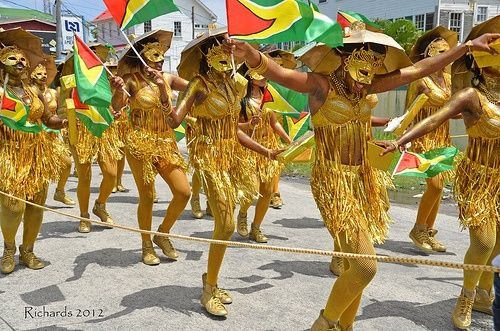The Transatlantic Journey
The story of Guyana’s African heritage begins with the Transatlantic Slave Trade, a dark chapter in history that saw millions of Africans forcibly transported to the Americas. The journey across the Atlantic Ocean was marked by unimaginable suffering, but it laid the foundation for a resilient and enduring legacy.
Important Figures in Guyana’s African Heritage
Cuffy (Kofi)
Cuffy, whose African name was Kofi, is one of the most iconic figures in Guyana’s history. He led the Berbice Slave Rebellion in 1763, a courageous uprising against oppressive plantation owners. Although the rebellion was ultimately suppressed, Cuffy’s legacy as a symbol of resistance and freedom lives on.
Quamina and Jack Gladstone
Quamina and his son, Jack Gladstone, were leaders of the 1823 Demerara Slave Rebellion. Their determination to secure justice and freedom for their fellow enslaved Africans marked a pivotal moment in the fight against slavery in Guyana.
Hubert Nathaniel Critchlow
In the 20th century, Hubert Nathaniel Critchlow emerged as a prominent labor leader and advocate for workers’ rights. His efforts played a crucial role in improving the working conditions and rights of laborers in Guyana.
Jan Carew
Jan Carew, born in Guyana, was a prolific writer, poet, and activist. He used his literary talents to highlight the experiences of Afro-Guyanese and promote social justice. His work continues to inspire writers and activists today.
Sir David Rose
Sir David Rose was a trailblazer in Guyana’s political landscape. He became the country’s first Afro-Guyanese Governor-General and played a significant role in post-independence politics.
Cultural Heritage and Traditions
Guyana’s African heritage is celebrated in various ways, from vibrant festivals to traditional music and dance. Events like Mashramani, which takes place every February, showcase the exuberant spirit of the nation and pay homage to its African roots.
Religious Diversity
African religious traditions, such as Obeah and Myalism, have also left their mark on Guyana’s cultural landscape. These practices are intertwined with the spiritual beliefs of Afro-Guyanese communities.
A Legacy of Resilience
The African heritage of Guyana is a testament to the resilience of a people who endured unimaginable hardships and emerged with their culture, traditions, and spirit intact. It serves as a reminder of the strength and determination of those who came before us.
Honoring the Ancestors
As we reflect on Guyana’s African heritage, we pay tribute to the names and stories of those who shaped the nation’s history. Their legacy lives on, not just in the pages of history books but in the hearts and lives of all Guyanese, as they continue to celebrate the heritage and contributions of their African ancestors.
